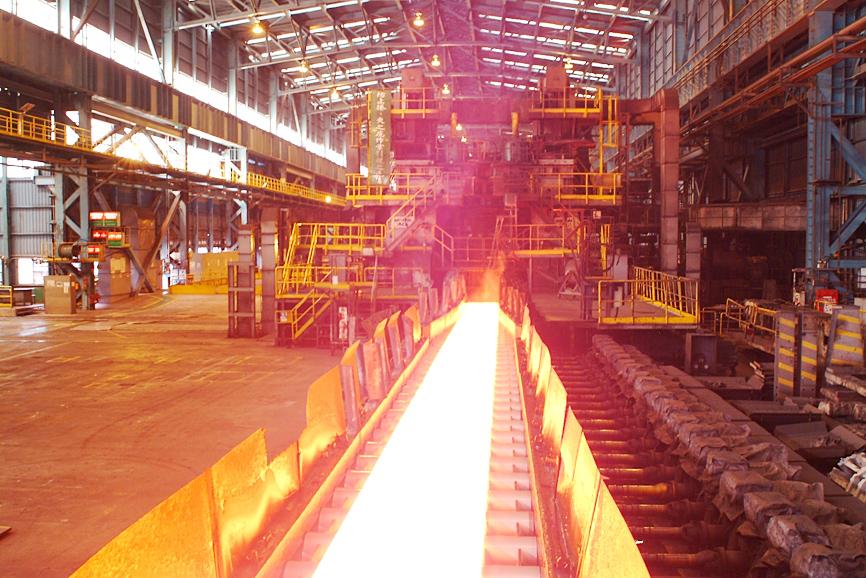China Steel Corp (CSC, 中鋼), the nation’s largest steelmaker, yesterday said it would raise domestic prices by 1.2 percent to reflect higher manufacturing costs and rising steel demand after a two-month price freeze. The revised prices take effect next month.
During the COVID-19 pandemic, CSC raised steel prices straight for 12 months before freezing them last month, citing concerns for downstream companies, and advising them to use the price freeze to adjust their business needs and “prepare for changes that are to come.”
There has been a “short and healthy correction” to Asian steel prices, but the company anticipates a return to steel’s bull run.

Photo courtesy of China Steel Corp
The global steel market is expected to tighten ahead of the traditional “high season” of September and October, the company said.
The continued strength of Taiwanese exports and US and European infrastructure projects present other factors in boosting steel demand, it said.
“We anticipate that the basic infrastructure needs of the US and the EU should create global economic growth, raising demand for steel products,” it said.
“Considering the steady but strong overall direction of the steel market and the higher cost of ore and coking coal, we have adjusted the price for domestic delivery up by 1.2 percent in November,” it said.
Another factor that led the company to anticipate a rebound in international steel is the creation of new Chinese regulations set to meet their carbon neutrality goals.
“The Chinese government has mandated a reduction of crude steel for the second half of 2021 by 60 million tonnes,” the company said. “At the same time, they have raised export tariffs for chromite and high-purity pig iron to 40 percent and 20 percent respectively.”
The prices of hot-rolled steel plates and coils, cold-rolled and electroplated steel coils, and other steel products with monthly determined prices are to go up by NT$500 per tonne. Mid-quality electroplated steel coils will go up by NT$300 per tonne.
Steel products whose prices are adjusted on a quarterly basis will remain the same until the next meeting of the CSC pricing committee, which would meet next month and also discuss steel pricing that would take effect later in the year.

PROTECTION: The investigation, which takes aim at exporters such as Canada, Germany and Brazil, came days after Trump unveiled tariff hikes on steel and aluminum products US President Donald Trump on Saturday ordered a probe into potential tariffs on lumber imports — a move threatening to stoke trade tensions — while also pushing for a domestic supply boost. Trump signed an executive order instructing US Secretary of Commerce Howard Lutnick to begin an investigation “to determine the effects on the national security of imports of timber, lumber and their derivative products.” The study might result in new tariffs being imposed, which would pile on top of existing levies. The investigation takes aim at exporters like Canada, Germany and Brazil, with White House officials earlier accusing these economies of

EARLY TALKS: Measures under consideration include convincing allies to match US curbs, further restricting exports of AI chips or GPUs, and blocking Chinese investments US President Donald Trump’s administration is sketching out tougher versions of US semiconductor curbs and pressuring key allies to escalate their restrictions on China’s chip industry, an early indication the new US president plans to expand efforts that began under former US president Joe Biden to limit Beijing’s technological prowess. Trump officials recently met with their Japanese and Dutch counterparts about restricting Tokyo Electron Ltd and ASML Holding NV engineers from maintaining semiconductor gear in China, people familiar with the matter said. The aim, which was also a priority for Biden, is to see key allies match China curbs the US

Teleperformance SE, the largest call-center operator in the world, is rolling out an artificial intelligence (AI) system that softens English-speaking Indian workers’ accents in real time in a move the company claims would make them more understandable. The technology, called accent translation, coupled with background noise cancelation, is being deployed in call centers in India, where workers provide customer support to some of Teleperformance’s international clients. The company provides outsourced customer support and content moderation to global companies including Apple Inc, ByteDance Ltd’s (字節跳動) TikTok and Samsung Electronics Co Ltd. “When you have an Indian agent on the line, sometimes it’s hard

‘SACRED MOUNTAIN’: The chipmaker can form joint ventures abroad, except in China, but like other firms, it needs government approval for large investments Taiwan Semiconductor Manufacturing Co (TSMC, 台積電) needs government permission for any overseas joint ventures (JVs), but there are no restrictions on making the most advanced chips overseas other than for China, Minister of Economic Affairs J.W. Kuo (郭智輝) said yesterday. US media have said that TSMC, the world’s largest contract chipmaker and a major supplier to companies such as Apple Inc and Nvidia Corp, has been in talks for a stake in Intel Corp. Neither company has confirmed the talks, but US President Donald Trump has accused Taiwan of taking away the US’ semiconductor business and said he wants the industry back